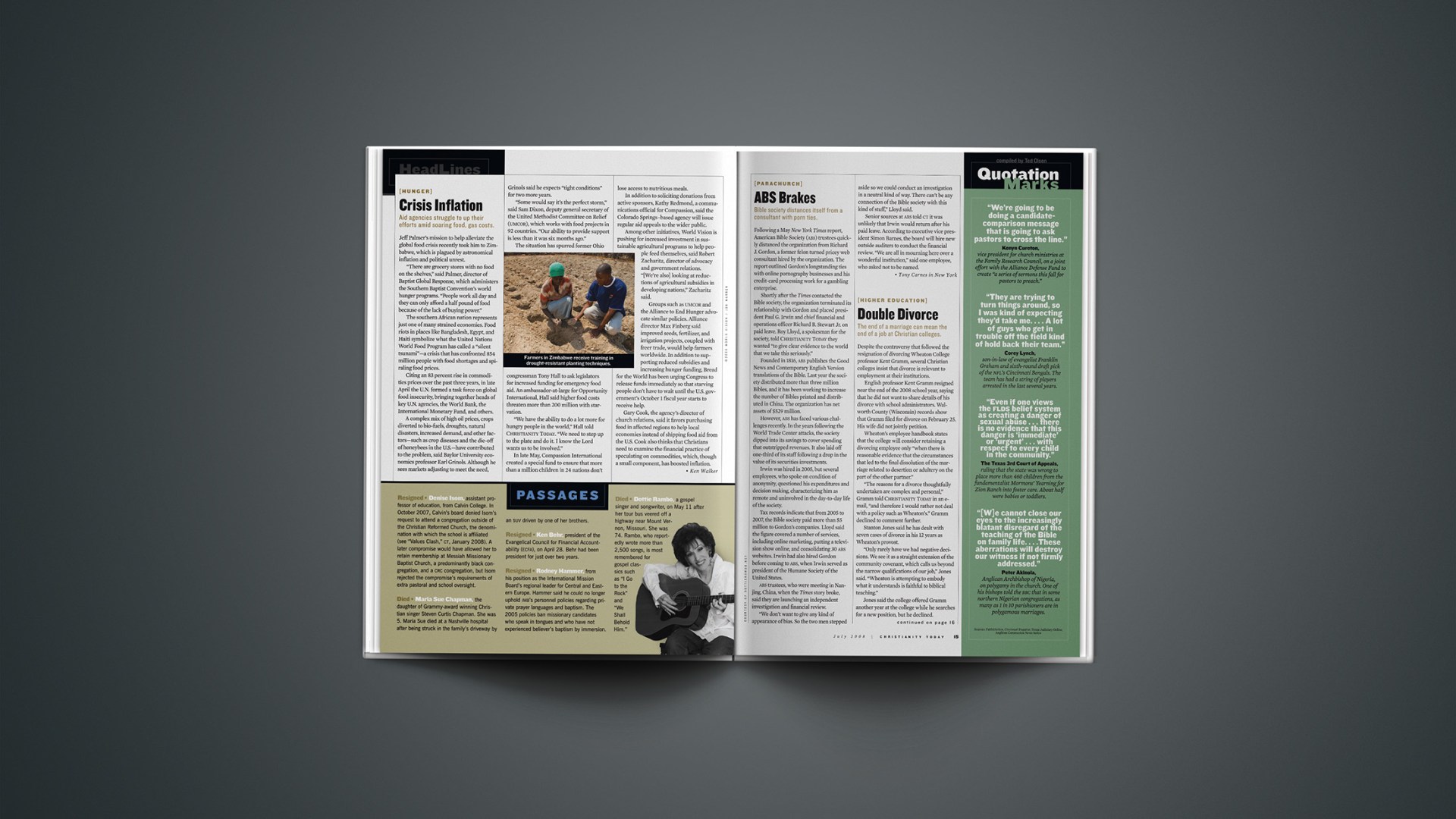Jeff Palmer’s mission to help alleviate the global food crisis recently took him to Zimbabwe, which is plagued by astronomical inflation and political unrest.
“There are grocery stores with no food on the shelves,” said Palmer, director of Baptist Global Response, which administers the Southern Baptist Convention’s world hunger programs. “People work all day and they can only afford a half pound of food because of the lack of buying power.”
The southern African nation represents just one of many such strained economies. Food riots in places like Bangladesh, Egypt, and Haiti symbolize what the United Nations World Food Program has called a “silent tsunami”— a crisis that has confronted 854 million people with food shortages and spiraling food prices.
Citing an 83 percent rise in commodities over the past three years, in late April the U.N. formed a task force on global food insecurity, bringing together heads of key U.N. agencies, the World Bank, the International Monetary Fund, and others.
A combination of high oil prices, crops diverted to bio-fuels, droughts, natural disasters, increased demand, and other factors–such as crop diseases and the die-off of honey bees in the U.S. — have contributed to the problem, said Baylor University economics professor Earl Grinols. Although he sees markets adjusting to meet the need, Grinols said, “We should expect we’ll see tight conditions for two more years.”
“Some would say it’s the perfect storm,” said Sam Dixon, deputy general secretary of the United Methodist Committee on Relief (UMCOR), which works with food projects in 92 countries. “Our ability to provide support is less than it was six months ago.”
The situation has spurred former Ohio Congressman Tony Hall to ask legislators for increased funding for emergency food aid, including restoring money cut from the McGovern-Dole Food Program. (In May, a House-Senate conference committee boosted the amount by $24 million.)
An ambassador-at-large for Opportunity International, Hall said higher food costs threaten more than 200 million with starvation. “We have the ability to do a lot more for hungry people in the world,” Hall told Christianity Today. “We need to step up to the plate and do it. I know the Lord wants us to be involved.”
Christian agencies are forming new initiatives, increasing donor appeals, and advocating for changes in U.S. government policies. In late May, Compassion International created a special fund to insure that more than a million children in 24 nations don’t lose access to nutritious meals.
In addition to soliciting donations from active sponsors, Kathy Redmond, a communications official for Compassion, said the Colorado Springs-based agency will issue regular aid appeals to the wider public. “It’s unclear how much we need to raise; we’re at the very beginning of this crisis,” said Redmond. “We have children who are crying when they come to a project to eat because they know their family is starving.”
Among other initiatives, World Vision is pushing for increased investment in sustainable agricultural programs to help others feed themselves, said Robert Zacharitz, director of advocacy and government relations. “[We’re also] looking at reductions of agricultural subsidies in developing nations,” Zacharitz said. “So in a sense, you can create long-term opportunities for access to markets for farmers in the developing world.”
Groups such as umcor and the Alliance to End Hunger advocate similar policies. Alliance director Max Finberg said improved seeds, fertilizer, and irrigation projects, coupled with freer trade, would help farmers worldwide. In addition to supporting reduced subsidies and increasing hunger funding, Bread for the World has been urging Congress to release funds immediately so that starving people don’t have to wait until the U.S. government’s October 1 fiscal year starts to receive help.
Gary Cook, the agency’s director of church relations, said it favors purchasing food in affected regions to help local economies instead of shipping food aid from the U.S. Cook also thinks that Christians need to examine the financial practice of speculating on commodities, which, though a small component, has helped to boost inflation.
Copyright © 2008 Christianity Today. Click for reprint information.
Related Elsewhere:
Tim Stafford reported on why some places have famine over and over again.
USAID keeps track of what countries are experiencing or at risk for food shortages.
Newser news aggregate site has a thread on Crop Woes.










